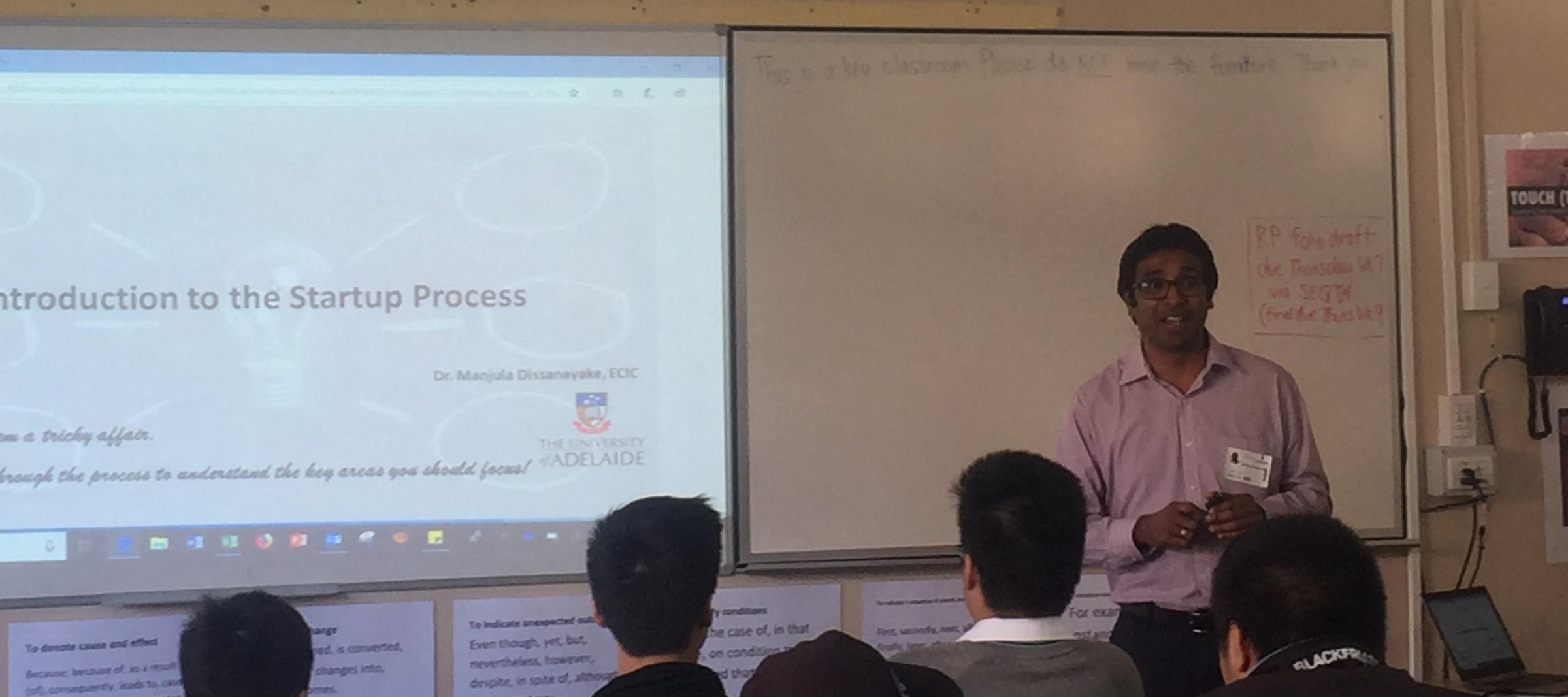Humanities and Social Sciences
Dr Manjula Dissanayake from the University of Adelaide guest lecturer speaking with the students

Humanities and Social Sciences
Dr Manjula Dissanayake from the University of Adelaide guest lecturer speaking with the students
Recently Mrs April Crisanti (wife of Blackfriars APRIM Matthew Crisanti) spoke to the Entrepreneurship and Innovation class about her entrepreneurial experience. April’s business Moveit provides fitness, craft and wellbeing programs for young children in Out of School Hours Care (OSHC), Kindergartens, Child Care Centres and Early Learning Centres (ELC). Moveit offers over 40 different themed programs including yoga, dance, adventure-based play and art and craft. April coordinates numerous subcontractors who run the various programs across Adelaide, as well as facilitating programs herself.
April also has a more specialised mindfulness business aimed at ELC’s and Childcare Centres called Mindful Kiddo.
April explained her experience and goals with setting up her business 14 years ago and how it has grown over the years to become the largest service provider of education and fitness programs for young children in South Australia. She explained that her passion was fitness and wellbeing, and she saw an opportunity to grow a business from programs specifically targeted to young children. She stressed the importance of having the right training and explained to the boys that she has completed numerous fitness and mindfulness courses and accreditations.
To help start and run her business April began with a business plan that included short- and long-term goals. She needed to set up a legal contract and sought the assistance of the Business Enterprise Centre. She stressed that there are numerous government and council run organisations that will assist new entrepreneurs to sort out all the necessary planning and paperwork.
April’s advice to the boys wishing to become entrepreneurs themselves:
Finally, April encouraged the class to consider an entrepreneurial path due to the many rewards running your own enterprise can bring. Her greatest reward has been satisfaction and pride in what she has created and built, knowing that she makes a difference to the children who enjoy her programs.
For more information please visit April’s websites for MoveIt https://www.moveitfp.com.au/ and Mindful Kiddo www.mindfulkiddo.com.au.
Dr Manjula Dissanayake, University of Adelaide: Guest lecturer, steps involved in start-up
Dr Dissanayake is the Cofounder and Chief Technology Officer of two companies that he started while living in Silicon Valley California before moving to Adelaide to complete his PHD at Adelaide University. His two software companies are Emovyz and Emojot.
His purpose in visiting the class was to explain what is involved with a start-up. He began by confirming that students understood differences between an entrepreneurial innovation and a small business by showing growth data. Then using data collected in the USA and globally he outlined what the average entrepreneur was like and how entrepreneurs gain the capital needed to launch and develop their innovation.
He went over a checklist of what an entrepreneur needs to organise setting up a business. The checklist was a little overwhelming but Manjula stressed that support is available from various government organisation and the University of Adelaide to assist with all the following:
Manjula also explained that innovators are usually good at coming up with ideas but generally have little knowledge of how to market their product or service. He outlined the different assistance available to entrepreneurs to learn how to market including networking, community and start-up events, formal education, industry education, coworking spaces, incubators and accelerators, advisory services, government assistance and finally investors.
The University of Adelaide has the Thinclab known as,
The home to the creative thinkers, the rule-breakers, the challengers. The ones who see the world differently, and for whom ideas are everything and the future is unlimited.
Ms Johnson is currently trying to organise for the class to visit the Thinclab.
Dr Manjula Dassanayake was a knowledgeable and inspiring speaker who was able to give the boys some insight into the complexities for an entrepreneur to start-up while also assuring the class that help is available. In the end the real challenge for a budding entrepreneur is to build an idea that people want to buy!
Ms Kathleen Johnson
CURRICULUM LEADER: HUMANITIES AND SOCIAL SCIENCES